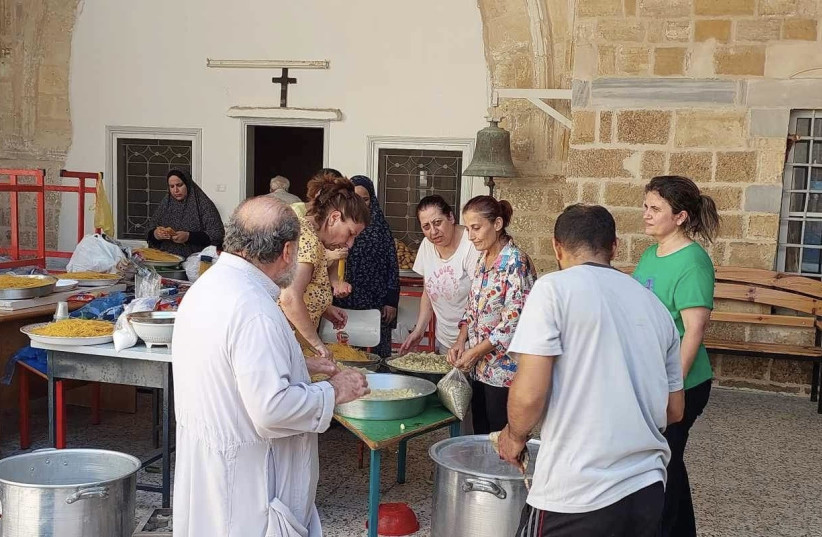At least 30 Christians living in the Gaza Strip have died since October 7 and the start of the Israel-Hamas war, according to the Aid to the Church in Need (ACN) organization, citing the Latin Patriarchate of Jerusalem.
The 30 include 17 who were killed when an Israeli missile hit the Greek Orthodox Church of Saint Porphyrius on October 19, two women who were shot and killed by an Israeli sniper while walking inside the grounds of the Catholic Holy Family Church, and 11 who have died from illnesses that could not be adequately treated due to the war.
When the war started, only around 1,000 Christians lived in Gaza.
"Hygiene has become a serious issue, especially for the children, who are falling ill because of lack of water and basic supplies, such as flour and diapers," George Akroush, director of the Project Development Office of the Latin Patriarchate of Jerusalem, told ACN, adding that at least another 10 people are at risk of dying due to lack of treatment.
Maria Lozano, a spokesperson for ACN, told The Jerusalem Post that the situation in Gaza is "horrible for everyone. Christians are always in the middle of two groups fighting for generations. Who is suffering more? I cannot say. Every individual is suffering a lot."

The IDF responded to the situation by telling the Post that Israel “is fighting against the murderous terrorist organization Hamas in the Gaza Strip, which systematically places its operatives and military assets within civilian populations, conducting warfare from civilian areas and using civilians as human shields.”
The military said that despite Hamas’s tactics, since the beginning of the conflict, it has employed various means to minimize harm to the civilian population and civilian structures as much as possible, including sending messages through leaflets, phone calls, audio recordings, and text messages to the residents of Gaza instructing them to evacuate specific areas that serve as centers of terrorist activity.
“The IDF will act to destroy the military capabilities of Hamas, in accordance with international law, while minimizing harm to non-combatants as much as possible,” the IDF said.
Faith leaders are helping Christians in Gaza
According to ACN, one priest and seven religious sisters from three different congregations have teamed up to help around 560 Christians who continue to seek refuge at the Holy Family Church in Gaza City, where they lack water and electricity. Lozano said ACN and other charities have been working with the Latin Patriarchate of Jerusalem to provide medicine and food to these people.
“We are trying to help as much as we can in this horrible time,” Lozano said, speaking to the Post from Germany. However, she could not provide specific details because “the situation is very sensitive.”
Last week, the international humanitarian aid foundations Orthodox Public Affairs Committee (OPAC) and Mosaic Middle East launched an appeal to raise funds for Palestinian Christians in Gaza in coordination with the Greek Orthodox Patriarchate of Jerusalem and the office of His Beatitude, Patriarch Theophilos III.
Their money is also going to Holy Family and Saint Porphyrius to provide essential services such as water, food and washing facilities, as well as petrol to maintain the operation of generators.
George Gigicos, the co-founder and chairman of OPAC, told the Post that around 400 families seek refuge in the Saint Porphyrius compound or receive daily emergency assistance there – not all of them Christian. According to ACN, around 560 Christians – Catholic and Orthodox – from 180 families are living in the Holy Family church compound. This includes 140 children, some 60 with disabilities, and 84 seniors over the age of 65.
When the war first started, more than 700 people were in the Holy Family compound, but many have died or left Gaza. Lozano said that between 50 and 60 Christians with dual nationalities have fled the enclave to places like Egypt, Jordan, or even Canada.
The Christian population in the Gaza Strip was around 5,000 in 2005 when Israel unilaterally withdrew from 21 Israeli communities. Since then, it has rapidly declined, while the Muslim population has grown. A report by the University of Notre Dame cited 3,000 Christians living in Gaza in 2007 and only 1,300 in 2021 – mostly Greek Orthodox.
The university said the Christians were being “squeezed by the policies of Hamas” and its “insidious Islamization process.”
“Christians in Gaza today are targeted based on their religious faith,” according to the university. They are “made to feel like second-class citizens, despite their Palestinian patriotism and historical affinity to the land.”
Lozano said that the Christians in Gaza “live lives of faith” and receive “spiritual support” from the local priests and sisters. “This is very important at this time because there is so much fear and the violence is causing people to have traumatic reactions.”
She said she repeatedly hears from Christians that peace is the most important thing for them.
“They always tell us: ‘Peace, pray for peace,’” she said. “That is their wish: that peace will be restored and they can survive.”
